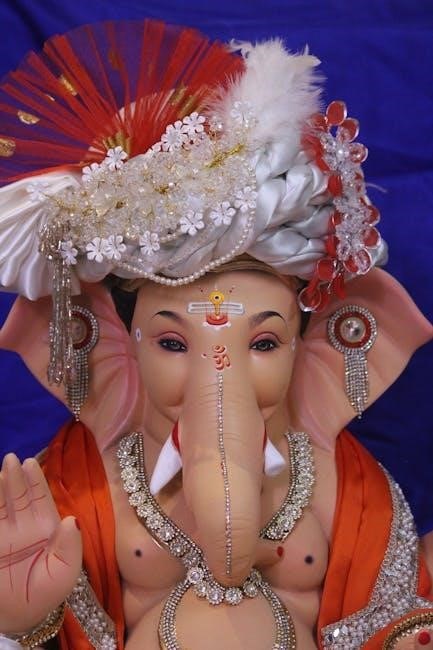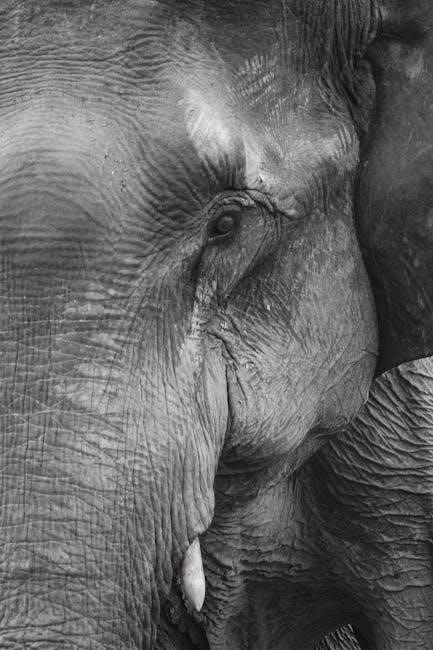George Orwell’s “Shooting an Elephant” is a gripping essay reflecting his experiences as a police officer in colonial Burma, exploring themes of imperialism and moral conflict.
Background Information on George Orwell
George Orwell, born Eric Arthur Blair in 1903, was a British novelist, essayist, and critic known for his sharp political commentary. His father, a colonial civil servant, influenced his early exposure to imperialism. Orwell studied in England, later serving as a police officer in colonial Burma, experiences that shaped his anti-imperialist views. His writing often explored totalitarianism and societal control, as seen in Animal Farm and 1984; Orwell’s clarity and moral urgency made him one of the 20th century’s most influential writers.
Historical Context of Colonial Burma
During the late 19th and early 20th centuries, Burma was under British colonial rule, which began in 1885 after the Third Anglo-Burmese War. The British exploited Burma’s resources, leading to widespread resentment among locals. As a police officer, Orwell witnessed firsthand the tensions between colonial authorities and native populations. His experiences in Burma deeply influenced his views on imperialism, which he later critiqued in “Shooting an Elephant.” The essay reflects the complexities of colonial life and the moral dilemmas faced by those enforcing British rule.
In “Shooting an Elephant,” George Orwell recounts his experiences as a British police officer in colonial Burma. A rogue elephant wreaks havoc, and Orwell, pressured by the local crowd, reluctantly decides to shoot it. The essay explores the moral dilemma Orwell faces, torn between his personal conscience and the expectations of those around him. Ultimately, he shoots the elephant, not out of necessity, but to maintain his authority. The story critiques imperialism, revealing the inherent tensions and moral complexities of colonial rule.

Key Themes
The essay explores themes of imperialism, moral conflict, and societal pressure, highlighting the tension between personal conscience and colonial expectations.
Imperialism and Colonialism
In “Shooting an Elephant,” Orwell critiques the exploitation and moral corruption of imperialism. As a colonial officer in Burma, he feels trapped by the oppressive system, forced to act against his conscience to maintain British authority. The essay highlights how imperialism dehumanizes both the colonizer and the colonized, creating a cycle of oppression. Orwell’s narrative exposes the hypocrisy of colonial rule, where power is maintained through fear and violence rather than justice or equality.
Moral Conflict and Personal Struggle
Orwell’s essay vividly portrays his internal turmoil as a colonial officer. Torn between his moral opposition to killing the elephant and societal pressure to act, he feels a deep sense of helplessness. The narrator’s reluctance to shoot the elephant, despite knowing it’s unnecessary, underscores the conflict between personal ethics and external expectations. This struggle reflects the broader human tendency to conform to societal norms, even when they contradict one’s values, highlighting the psychological toll of such decisions.
Societal Pressure and Conformity
Orwell’s essay illustrates the overwhelming power of societal pressure, as the narrator feels compelled to shoot the elephant to maintain his authority and avoid ridicule. The presence of the crowd forces him to conform to expectations, despite his moral reservations. This highlights how individuals often prioritize social approval over personal ethics, revealing the destructive influence of conformity in upholding oppressive systems like colonialism. The essay critiques how societal norms can lead to morally questionable actions, driven by the fear of appearing weak or incompetent.

Symbolism in the Essay
The elephant and rifle serve as powerful symbols, representing colonial oppression, the destruction of innocence, and the corrupting influence of authority in Burma.
The Elephant as a Symbol
The elephant symbolizes both the oppressed indigenous population and the untamed natural world. Its destruction represents the senseless violence of colonialism and the loss of innocence. Orwell’s act of shooting the elephant, despite his moral reservations, underscores the destructive nature of imperialism. The elephant’s death serves no practical purpose, mirroring the futility of colonial dominance. This powerful imagery critiques the moral corruption inherent in systems of oppression, where individuals act against their conscience to maintain authority. The elephant’s demise symbolizes the devastating cost of imperialism on both the colonized and the colonizer.
The Rifle as a Symbol of Power
The rifle in “Shooting an Elephant” embodies colonial authority and its oppressive weight. Orwell carries it as a symbol of British power, yet it burdens him, representing the coercive force of imperialism. The rifle’s presence amplifies the pressure from the crowd, compelling Orwell to act against his moral judgment. Its significance lies in its dual role: as a tool of control and a source of internal conflict. The rifle symbolizes the broader struggle between personal ethics and societal expectations, highlighting the moral dilemmas of colonial rule.

George Orwell’s Literary Style
George Orwell’s literary style is marked by clarity and simplicity, effectively conveying moral and political themes through vivid storytelling and accessible prose in his essays.
Clarity and Simplicity of Prose
George Orwell’s prose in “Shooting an Elephant” is characterized by its directness and accessibility. His writing avoids complexity, making it easy for readers to engage with the narrative. Orwell uses straightforward language to convey deep moral and political themes, ensuring his message resonates widely. This clarity enhances the essay’s emotional impact, particularly in depicting the tension between personal morality and societal expectations. His simple yet powerful style allows the reader to focus on the gravity of the narrator’s dilemma, making the essay both thought-provoking and enduring.
Narrative Structure and Tension
Orwell’s essay “Shooting an Elephant” employs a chronological narrative structure that builds tension through vivid descriptions and emotional depth. The narrator’s internal conflict is heightened by the external pressure of the crowd, creating a sense of inevitability. Orwell’s use of descriptive language and precise detail escalates the tension, drawing readers into the moral dilemma. The narrative’s pacing mirrors the narrator’s growing anxiety, culminating in the tragic yet deliberate act of shooting the elephant. This structure effectively conveys the psychological and societal pressures at play.

Historical Context of British Colonialism in Burma
British colonial rule in Burma began in the 19th century, leading to widespread resentment among locals. Orwell’s essay reflects the tense dynamics during this period of imperial control.
The British Raj and Its Impact
The British Raj, the period of British rule in India and Burma, profoundly shaped the region’s political and social landscape. In Burma, this era was marked by exploitation, cultural disruption, and rising anti-colonial sentiment. Orwell’s essay reflects his firsthand experience of this tense environment, where colonial authority often led to moral and ethical dilemmas. The British Raj’s expansion into Burma disrupted local traditions and economies, fostering widespread resentment. Orwell’s narrative captures the complexities of colonial rule, highlighting its impact on both the ruled and the rulers, offering a nuanced critique of imperialism’s legacy.
Burma’s Role in the Empire
Burma, as a colony of the British Empire, played a significant role in the imperial economy and strategic interests. Its resources, particularly rice and teak, were exploited to fuel British prosperity. The region’s location also made it a crucial outpost for expanding influence in Southeast Asia. However, Burma’s integration into the empire was marked by resistance, as local traditions and governance were disrupted. Orwell’s essay reflects the tensions of this period, highlighting Burma’s complex position within the empire and the growing anti-colonial sentiment that shaped its history.

Biographical Insights
George Orwell, born in 1903 and passing in 1950, drew heavily from his experiences as a sub-divisional police officer in Burma, shaping his critical views on imperialism and authority.
Orwell’s Time in Burma
During his tenure as a sub-divisional police officer in Moulmein, Burma, Orwell witnessed firsthand the complexities of colonial rule, fostering a deep-seated disdain for imperialism. His experiences in this region, marked by anti-European sentiment and the oppressive British Raj, significantly influenced his writing, particularly in “Shooting an Elephant.” The essay captures the moral dilemmas and societal pressures Orwell faced, reflecting his growing critique of colonialism and its impact on both the ruled and the rulers.
How the Experience Shaped His Writing
Orwell’s time in Burma profoundly shaped his literary style and thematic focus, as seen in “Shooting an Elephant.” The essay showcases his ability to blend personal narrative with political commentary, highlighting the moral complexities of imperialism. His experiences instilled a critical perspective on authority and power, themes that would dominate his later works like Animal Farm and 1984. The incident of shooting the elephant became a metaphor for the destructive nature of colonialism, solidifying Orwell’s reputation as a biting social critic.

Cultural and Political Significance
“Shooting an Elephant” remains a powerful critique of colonialism, influencing anti-imperialist movements and sparking global discussions on power dynamics and moral responsibility.
The Essay’s Influence on Anti-Colonial Movements
Orwell’s “Shooting an Elephant” has profoundly influenced anti-colonial movements by exposing the moral complexities and inherent brutality of imperialism. The essay, detailing Orwell’s reluctant shooting of an elephant to maintain colonial authority, became a powerful symbol of resistance against oppressive regimes. It highlighted how colonialism dehumanizes both the rulers and the ruled, resonating with anti-colonial leaders worldwide. By critiquing British imperialism, Orwell’s work inspired movements seeking liberation and self-determination, cementing its role in the broader struggle against colonial domination and its enduring relevance today;
Modern Relevance of the Essay’s Themes
Orwell’s “Shooting an Elephant” remains strikingly relevant today, as its themes of oppression, moral ambiguity, and societal pressure resonate with contemporary issues. The essay critiques power dynamics, echoing modern struggles against systemic inequality and authoritarianism. Its exploration of moral conflict and the dangers of unchecked authority continues to inspire reflection on personal ethics and societal responsibilities. The text’s timeless appeal lies in its universal themes, making it a powerful tool for understanding human behavior and the consequences of conformity in any era.
Orwell’s “Shooting an Elephant” remains a powerful critique of imperialism, offering timeless insights into moral conflict and the dangers of unchecked power.
Reflection on the Essay’s Enduring Importance
George Orwell’s “Shooting an Elephant” remains a vital critique of imperialism, offering enduring insights into moral conflict and societal pressure. The essay’s exploration of colonial dynamics and personal struggle continues to resonate, reflecting Orwell’s experiences in Burma. Its influence on anti-colonial movements underscores its historical significance. Today, the essay remains relevant, prompting discussions on power and morality. Orwell’s vivid narrative ensures its lasting impact, making it a cornerstone of literary and political discourse.
Final Thoughts on Orwell’s Message
Orwell’s “Shooting an Elephant” delivers a powerful critique of imperialism, highlighting the moral complexities faced by individuals within oppressive systems. The essay serves as both a personal account and a broader commentary on colonialism’s dehumanizing effects. Orwell’s narrative underscores the universal themes of power abuse and the loss of individual freedom. His vivid portrayal of internal conflict resonates deeply, illustrating how societal expectations can compel individuals to act against their conscience. Ultimately, the essay remains a timeless reflection on the dangers of unchecked authority and the enduring relevance of moral courage.































































